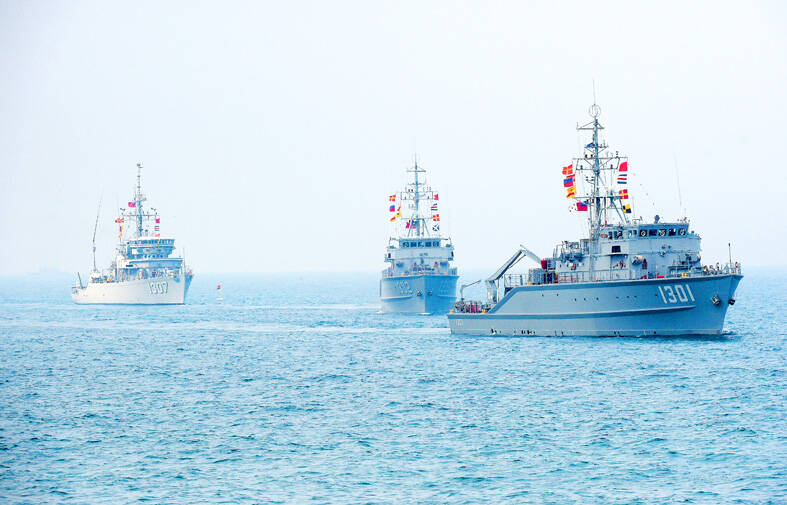The military is reportedly planning to install demining devices on part of its drone fleet and expedite previously planned updates to its demining technologies.
The navy is also planning to create a force focused on minelaying and demining, military sources said, speaking on condition of anonymity.
The navy’s plan, outlined in a recent report to the Legislative Yuan, is part of its response to heightened threats to the nation and the evolution of mine technology, the sources said.

Photo: Huang Yao-cheng, Taipei Times
Mid-sized uncrewed multipurpose submarines, which the navy has commissioned the Chungshan Institute of Science and Technology to develop, would also be part of the project, codenamed “Huilong” (慧龍), they said.
The prototype for the submarines would enter testing in the third quarter of this year, they said.
The navy has previously said that it seeks to emulate the US and European nations that use uncrewed ships to detect, locate and clear mines.
The sources cited the report as saying that the navy’s domestically produced naval drones would be equipped with advanced demining technology to counter Chinese capabilities to lay mines in the Taiwan Strait.
The project would also help maintain the safety of commercial ships in the Strait, they said.
The navy operates four advanced rapid minelaying ships and is planning to commission four more, one of the sources said.
The project’s budget is NT$7.4 billion (US$242.9 million) and the tender to build the ships began in February, they added.
The updates to the military’s minelaying and demining capabilities come after Taiwan People’s Party Legislator Chiu Chen-yuan (邱臣遠) last year urged the military to commission new purpose-built ships, saying that its Yung Yang demining vessel entered service in the US in 1954 and was bought by Taiwan in 1993.

Taiwan yesterday denied Chinese allegations that its military was behind a cyberattack on a technology company in Guangzhou, after city authorities issued warrants for 20 suspects. The Guangzhou Municipal Public Security Bureau earlier yesterday issued warrants for 20 people it identified as members of the Information, Communications and Electronic Force Command (ICEFCOM). The bureau alleged they were behind a May 20 cyberattack targeting the backend system of a self-service facility at the company. “ICEFCOM, under Taiwan’s ruling Democratic Progressive Party, directed the illegal attack,” the warrant says. The bureau placed a bounty of 10,000 yuan (US$1,392) on each of the 20 people named in

The High Court yesterday found a New Taipei City woman guilty of charges related to helping Beijing secure surrender agreements from military service members. Lee Huei-hsin (李慧馨) was sentenced to six years and eight months in prison for breaching the National Security Act (國家安全法), making illegal compacts with government employees and bribery, the court said. The verdict is final. Lee, the manager of a temple in the city’s Lujhou District (蘆洲), was accused of arranging for eight service members to make surrender pledges to the Chinese People’s Liberation Army in exchange for money, the court said. The pledges, which required them to provide identification

Nine retired generals from Taiwan, Japan and the US have been invited to participate in a tabletop exercise hosted by the Taipei School of Economics and Political Science Foundation tomorrow and Wednesday that simulates a potential Chinese invasion of Taiwan in 2030, the foundation said yesterday. The five retired Taiwanese generals would include retired admiral Lee Hsi-min (李喜明), joined by retired US Navy admiral Michael Mullen and former chief of staff of the Japan Self-Defense Forces general Shigeru Iwasaki, it said. The simulation aims to offer strategic insights into regional security and peace in the Taiwan Strait, it added. Foundation chair Huang Huang-hsiung

’DISTORTION’: Beijing’s assertion that the US agreed with its position on Taiwan is a recurring tactic it uses to falsely reinforce its sovereignty claims, MOFA said The Ministry of Foreign Affairs (MOFA) yesterday said Chinese state media deliberately distorted Taiwan’s sovereign status, following reports that US President Donald Trump agreed to uphold the “one China” policy in a phone call with Chinese President Xi Jinping (習近平). During the more than one-hour-long call, Xi urged Trump to retreat from trade measures that roiled the global economy and cautioned him against threatening steps on Taiwan, a Chinese government summary of the call said. China’s official Xinhua news agency quoted Xi as saying that the US should handle the Taiwan issue cautiously and avoid the two countries being drawn into dangerous